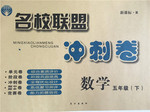题目内容
4.---Would you mind if I turned off the light?---____________.( )
| A. | Yes,go ahead | B. | No,please don't | ||
| C. | Go ahead,please | D. | Certainly,do as you please |
分析 ---你介意我把灯关了吗?
---不介意的,请关掉吧.
解答 答案C.
A项"是的,介意,请关掉灯吧";B项"不介意,请不要关灯";D项"当然,你想怎样做就怎样";"Do you mind my doing…?和Would you mind if I…?"的常见回答有:表示不介意"No,of course not./No,not at all./Certainly not./Go ahead,I don't mind./No,please do.等";表示介意时"I'm sorry…/I'm afraid…".根据上下文的语境可知,上文中表示"你介意我把灯关了吗",答句中回答"不介意,请关掉吧";"Goahead 表示同意或允许,意为"说吧,做吧"",故选C.
点评 本题考查情景交际.解答此类题目首先应该读懂句意,分析上下文语境和逻辑关系.其次对每个选项中的交际用语的适用情况要掌握,根据语境锁定正确答案.关键平时学习中要对交际用语多积累多总结反复记忆.

练习册系列答案
 阳光考场单元测试卷系列答案
阳光考场单元测试卷系列答案 名校联盟冲刺卷系列答案
名校联盟冲刺卷系列答案 名校提分一卷通系列答案
名校提分一卷通系列答案 课程达标测试卷闯关100分系列答案
课程达标测试卷闯关100分系列答案
相关题目
14.---Is there anything I can do for you?
---I'm looking for a book, written by Han Han.( )
---I'm looking for a book, written by Han Han.( )
| A. | it | B. | that | C. | one | D. | the one |
12.-I haven't got my composition notebook yet,and I'm afraid that I am going to be out of luck.
-Don't worry.You __________ have it after Miss Liu shows it to your class.( )
-Don't worry.You __________ have it after Miss Liu shows it to your class.( )
| A. | could | B. | shall | C. | must | D. | may |
19.-Tom has been working for more than 9hours!
-He _________be very tired.( )
-He _________be very tired.( )
| A. | will | B. | must | C. | has to | D. | shall |